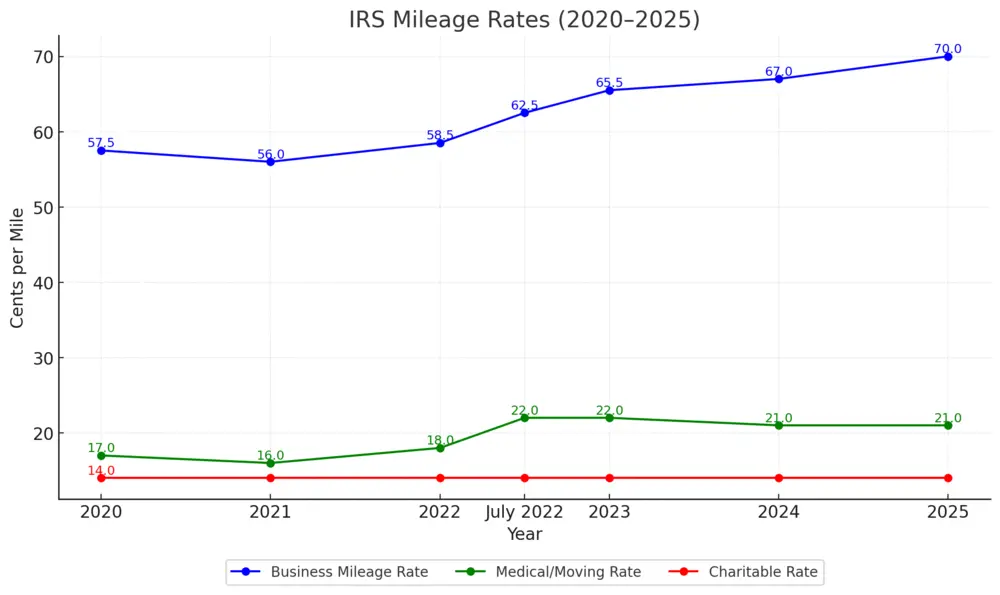Last updated on January 21, 2025
Are you ready to navigate the world of the IRS medical mileage rate without getting a heart attack? Look no further because we’ve got you covered. In this article, we’ll be taking a closer look at the medical mileage deduction and sharing some tips on how to make the most of it.
What is a Medical Mileage Rate and Why Should You Care?
Let’s face it – no one likes going to the doctor. But what’s even worse than sitting in a waiting room for hours on end? Trying to make sense of the IRS regulation 502 for medical mileage rates. However, understanding these rates is crucial if you want to save money on your healthcare expenses.
With the cost of medical treatments and prescriptions on the rise, every penny counts. So, buckle up and get ready to dive into the world of medical mileage rates – your wallet (and your sanity) will thank you.
IRS Medical Mileage Rate: How to Save Money on Healthcare Expenses
In the United States, the IRS sets the medical mileage rate per mile each year. The medical mileage rate is the amount of money you can deduct from your taxes for the miles you drive to and from medical appointments, hospitals, and other medical-related trips.
This Medical tax deduction mileage rate can help you save money on your taxes, which is especially important when medical costs can be quite expensive. Keeping track of your medical mileage is crucial if you want to claim the deduction, and it’s easy to do with the right tools, such as the MileageWise app. In an upcoming section of this article, I will provide a more comprehensive explanation of the MileageWise app.
2025 IRS Medical Mileage Rate
The IRS has set the medical mileage rate for 2025 at 21 cents per mile. While this may not seem like a large amount, it can quickly add up if you have a lot of medical appointments or long distances to travel.
By tracking your medical mileage, you can ensure that you are receiving the maximum amount of deductions possible, helping to offset the high cost of healthcare.
Understanding the Breakdown of Medical Mileage Expenses for Tax Deductions
Medical mileage expenses refer to the cost of driving to and from medical appointments, hospitals, and other healthcare-related destinations. The expenses may include fuel costs, maintenance and repairs, insurance, and other vehicle-related costs.
By tracking your medical mileage, you can deduct these expenses on your taxes or get reimbursed by your employer or insurance company. Keeping a detailed medical mileage log is essential to accurately calculating your expenses and maximizing your deductions or reimbursements.
Requirements for Claiming Medical Mileage as a Tax Deduction: What You Need to Know
It’s important to note that there are certain requirements you need to meet to claim medical mileage as a tax deduction. The miles you drive must be primarily for medical purposes, and your expenses must exceed 7.5% of your adjusted gross income (AGI). Additionally, you cannot claim mileage for trips that are reimbursed by your employer or insurance company.
Real-Life Example: How to Calculate Your Medical Mileage Deduction
David drove 6,000 miles for medical purposes during the year. His adjusted gross income (AGI) for the year is $30,000. To claim a tax deduction for medical mileage, David must first calculate 7.5% of his AGI, which is $2,250 (7.5% x $30,000).
Since his medical expenses, including the 6,000 miles driven, exceed $2,250, David is eligible to claim a tax deduction. Using the 2025 IRS medical mileage rate of 21 cents per mile, David can deduct $1,260 (6,000 miles x $0.21) from his taxable income.
In this example, David can deduct over $1,000 from his taxable income due to his high medical mileage and relatively low adjusted gross income.
It’s important to note that the deduction is limited to the amount of medical expenses that exceed 7.5% of AGI, so it’s possible to have a high amount of medical mileage but still not be eligible for a large deduction if the AGI is high or the total medical expenses are relatively low.
Don’t Get Tripped Up: Understanding Standard vs. Medical Mileage Rates
It’s important to note that the medical mileage rate is not the same as the standard mileage rate, which is used for business-related travel. While the standard mileage rate is also set by the IRS, it is typically a higher amount than the medical mileage rate. It’s important to keep track of your medical mileage separately from your business mileage to ensure that you are claiming the correct amount on your taxes. With an app like MileageWise that categorizes your trips, you can easily keep track of and separate your business, personal, medical, and charity mileage logs for tax purposes.
“Maximizing Your Medical Mileage Deduction: Tips and Tricks”
Keeping an Accurate Record with MileageWise
If you frequently make medical-related trips, you might be able to deduct the miles you drive from your taxes. But how can you make sure you’re getting the most out of your medical mileage deduction?
First and foremost, keeping an accurate record of your medical-related trips is essential in a medical mileage log. With the MileageWise app, you can automatically track and record all your medical-related trips and create detailed medical mileage logs for tax purposes.
The Importance of Detailed Medical Mileage Logs
To maximize your medical mileage deduction, it’s crucial to keep a detailed medical mileage log, including the date, purpose of the trip, and total miles driven (see other requirements here). This information will come in handy when it’s time to file your taxes. Remember to include all medical-related trips, including trips to the pharmacy to pick up prescriptions or medical supplies.
Not only does MileageWise provide an easy-to-use platform that allows you to track your mileage automatically, but it also categorizes your trips, and stores your mileage records securely, helping you keep a detailed mileage log for accurate tax reporting and reimbursement.
Consult with a Tax Professional
Consulting with a tax professional can also help you maximize your medical mileage deduction. They can provide guidance on how to properly report your deductions and ensure you’re taking full advantage of your tax savings. With MileageWise and a little bit of expert advice, you’ll be well on your way to maximizing your medical mileage deduction.
BE IRS-PROOF! JOIN OUR 20K+ USERS
The Benefits of Using MileageWise App for Tracking Your Medical Mileage”
Do you know what’s worse than having to go to the doctor? Having to keep track of all the miles you drive to get there. It’s enough to make even the most organized person pull their hair out. But fear not, my friends, because I’ve found a medical mileage tracker app that will make tracking your medical mileage so easy and painless, you might even start to enjoy it. I’m talking about MileageWise – the app that makes tracking your medical mileage “a walk in the park”.
MileageWise’s Plethora of Benefits
Using MileageWise for tracking your medical mileage offers a plethora of benefits. For one, you no longer have to worry about forgetting to log a trip or manually calculating your mileage. The app does it all for you automatically, so you can focus on what really matters – taking care of your health.
Automate Your Medical Mileage Tracking with MileageWise”
The benefits of using MileageWise for tracking your medical mileage are numerous. One of the most significant benefits is the app’s automatic tracking features. Once you input your trips into the app, it automatically tracks your mileage using GPS location tracking. This means you no longer have to worry about forgetting to log a trip or manually calculate your mileage. The app does it all for you, saving you time and effort.
Categorize Your Medical Mileage with MileageWise for Accurate Deductions
Another benefit of using MileageWise is the ability to classify your trips by purpose. You can easily categorize your trips as medical appointments, pharmacy visits, or other medical-related trips. This makes it easy to keep track of your medical mileage, while keeping them separate from your business and personal miles and ensures that you don’t miss any potential deductions.
Save Your Battery and Privacy with MileageWise’s Efficient Tracking
Unlike other mileage tracking apps, MileageWise doesn’t drain your battery by constantly tracking your every move. Instead, it only records your starting and ending locations, which makes it a battery-friendly app.
Additionally, MileageWise respects your privacy by not tracking your every move. The app only tracks your starting and ending locations, ensuring that your personal information is kept private.
Creating a 100% IRS-Proof Medical Mileage Log in Seconds with MileageWise
MileageWise’s advanced features ensure a 100% IRS-proof medical mileage log by capturing the necessary information required by the IRS, such as the date, time, purpose, starting and ending locations, and mileage for each medical trip.
By automating the mileage tracking process and categorizing trips based on the purpose of the drive, MileageWise creates a detailed and accurate medical mileage log in seconds, eliminating the risk of errors or omissions that could result in an audit or rejection of a tax deduction.
Securely Store Your Medical Mileage Data with MileageWise in the Cloud
MileageWise also keeps your data safe on the cloud, so you never have to worry about losing your mileage logs. The app automatically syncs your mileage data to the cloud, where it’s securely stored. This means you can access your mileage logs from anywhere, anytime, without fear of losing them.
Save Money and Time with Medical Mileage Tracking Using MileageWise
Navigating the world of medical mileage deductions can be a pain in the neck, but it doesn’t have to be. With the right tools and knowledge, like the MileageWise app and the tips and tricks we’ve shared, you can take the anxiety out of tax season and even save some money on your healthcare expenses.
So, next time you’re headed to the doctor’s office, don’t forget to fire up MileageWise and let it do the heavy lifting. Your wallet (and your sanity) will thank you, and you might even start to enjoy tracking your medical mileage – stranger things have happened!







